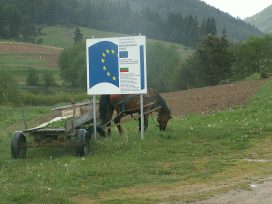
Radical reform is needed to make Europe’s agricultural sector financially sustainable and environmentally resilient. Yet Europe’s biggest farming lobby, together with the EPP, opposes any policy inimical to the interests of large landowners.
Samuel Abraham comments on the prevailing mood of scepticism in the accession countries and argues for a reinvigoration of the activities of the Visegrad group.
Becoming a member of the EU is a dream come true for a country like Slovakia that was in the past politically antagonistic to the EU, and economically impoverished in comparison with EU countries. Moreover, it is a great satisfaction that we did not automatically become members after the fall of the communist regime. Instead, it has been as a result of our own efforts in repelling populist and nationalist government in the 1990s. It will also be a great joy to cross the Slovak-Czech border once again without going through customs.
The 2004 EU-expansion also guarantees good neighbourly relations and security in a region that was source of instability and an object of continuous aggression in the past. For a country like Slovakia which is prone to generate enough of its internal problems, the external stability is decisive. As regards Austria, I hope that we will be able to break down the barriers of lack of interest and mutual ignorance. The wall is in our head. Easier to remove than a concrete wall but taking much longer.
Yet, as the admission of Slovakia to the EU is getting near one hardly notices any of the festive feelings one would expect. There are at least two reasons for this. Firstly, people by now are certain that Slovakia will be accepted and so outbursts of joy would be pointless. The second reason is more ominous: there has not been a serious, solid debate about the EU, other than a kind of glossy description of all the advantages (combined with a rather pathetic stress on “this momentous historical opportunity for Slovakia” etc.) as against criticism by nationalists who would like to see Slovakia isolated, as well as criticism by a new breed of Euro-sceptics inspired by their British counterparts and even more so by American neo-conservatives (not anti-EU as such, but suspicious of bureaucracy, high taxes and a politically strong centre).
Although the size of a country’s economy will always play a part, politically and administratively it would be a disaster to form a group of second-class countries in the EU. It has been so far – and must continue – a great virtue of the EU that being in the “club” prevents large and rich countries excluding the small ones from influencing the outcome of important European issues. This contributes to the self-confidence and self-esteem of less affluent newly accessing countries.
It is a common misconception in Slovakia that EU-membership will mean that most of our problems disappear or will automatically be resolved. However, I believe that they will be dealt with more easily. It will be much easier, for example, to deal with Slovak-Hungarian tensions within the framework of the EU rather than in the Slovak or Hungarian Parliaments, where the issue is often misused or not attended to at all.
However, only someone who knows nothing about the EU or has never lived under Moscow’s rule or under a Communist regime could ask if we are afraid that Brussels will become the new Moscow or Belgrade. I might add that there are quite a number of such people in Slovakia. The reason is that people are often unaware of the problems, backgrounds, advantages and aspirations of the Union and are confused by various contradicting signals coming in from various sources. And indeed there are some serious issues to be dealt with. For example, the danger that through expanded bureaucratization of the EU – expansion being one cause – the “centre” might become “impatient” with its individual, new and small members. This is not intended development but it seems to me, a possible outcome of the expanded EU.
Another danger is that EU might become a “Fortress Europe” turning the Schengen borders into a sort of new Iron Curtain that prevents those outside from entering. I am glad Slovakia will be within these borders but, as Conor Cruise O’Brien warns, we will need larger and larger doses of cynicism to keep our eyes closed to the plight of those who would like to get in, but whom the regulations, laws and our own silent approval would keep out.
I place great hopes in the Visegrad Group activities within the enlarged EU. It has a great potential to expand its membership not only of East European countries just joining the EU but also of post-communist countries that will soon be outside the border of the EU. The Visegrad Group, expanded and outreaching, could play a unique role within the Schengen – it should be that of a romantic, compassionate, spiritual group that does not close its eyes to the plight of those outside the EU, just as the V4 countries did not want to be left out in the past by their Western neighbours. The Visegrad initiative could be of great significance to those outside the EU – seeing the Union either as a hospitable, friendly and caring giant or as a fortress Europe that protects its prosperity and freedom at the expense of misery for those who stay outside.
Being able to identify sincerely with the description of “European” is, I guess, a task for us to bestow on the next generation. I think Europe is sophisticated and mature enough to leave aside, at this point, such declarations of identity – itself extremely complicated issue. I would find it pompous to call myself a European. I feel this when once a year on some festive occasion politicians declare themselves to be “the Europeans” – often at an open air event after listening to, often only the last part of, Beethoven’s 9 symphony.
A shorter version of this text has been published in Beyond Borders, the magazine of the ECF, European Cultural Foundation.
Published 28 November 2003
Original in English
First published by Eurozine
© Samuel Abraham / Eurozine
PDF/PRINTSubscribe to know what’s worth thinking about.

Radical reform is needed to make Europe’s agricultural sector financially sustainable and environmentally resilient. Yet Europe’s biggest farming lobby, together with the EPP, opposes any policy inimical to the interests of large landowners.

Ukraine’s EU candidacy has brought new momentum to an EU enlargement process suffering from a major crisis of credibility. But reservations towards enlargement run deep. The EU should admit this and propose an interim goal that still offers candidate countries genuine incentive for reform.